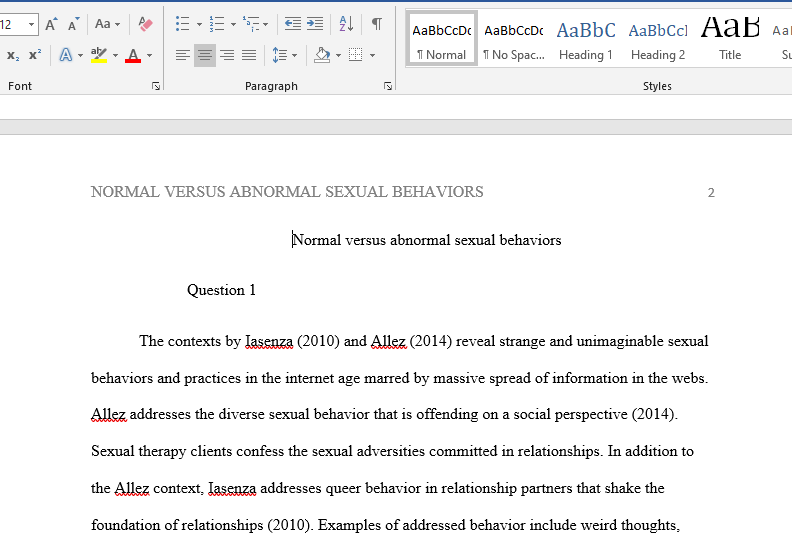Discuss on the Normal versus abnormal sexual behaviors
These are two separate questions and should be answered separately with a minimum of 200 words and include an in text cite
- a) After reading Iasenza (2010) and Allez (2014) what would determine what is considered normal v. abnormal sexual behavior or functioning in relationships?
- b)after reading Iasenza. (2010) and Lehmiller (2014) how would you work with a couple regarding normal and abnormal functioning in their relationship and the impact of paraphilias and their place in a relationship?
Reading to help answer the above question
Chapter 1 in Allez, G. H. (Ed.). (2014). Sexual Diversity and Sexual Offending: Research, Assessment, and Clinical Treatment in Psychosexual Therapy. London, GB: Karnac Books. Retrieved from http://www.ebrary.com
Chapter 13 Lehmiller, J. J. (2014). The Psychology of Human Sexuality (1). Somerset, GB: Wiley-Blackwell. Retrieved from http://www.ebrary.com
Iasenza, S. (2010). What is queer about sex?: Expanding sexual frames in theory and practice. Family Process, 49(3), 291-308. Retrieved from Proquest Database in the Touro Library.
2) The CDC offers an overview of the most common STD’s our client’s may present with. After reading the CDC report, and the Butler, et. al. (2010) and Meneses, et. al. (2014) articles, how would you work with a couple that has one of the members disclose they have an STD? You can choose if the couple is married or dating, and whether the STD was brought into the relationship or if the member contracted it while in the relationship.
Reading for above question
Acquaint yourself with the Center of Disease Control and Prevention’s information On Sexually Transmitted Diseases. Read about the kind of diseases there are and anything else that equips you to understand STD’s:
Centers for Disease Control and Prevention. Cancer Prevention and Control: World Cancer Day. 2014; http://www.cdc.gov/cancer/
Butler, M. H., Rodriguez, M.-K. A., Roper, S. O., & Feinauer, L. L. (2010). Infidelity Secrets in Couple Therapy: Therapists’ Views on the Collision of Competing Ethics Around Relationship-Relevant Secrets. Sexual Addiction & Compulsivity, 17(2), 82–105. Retrieved from Academic Search Complete Database in the Touro Library.
Answer preview:

Words: 1034
